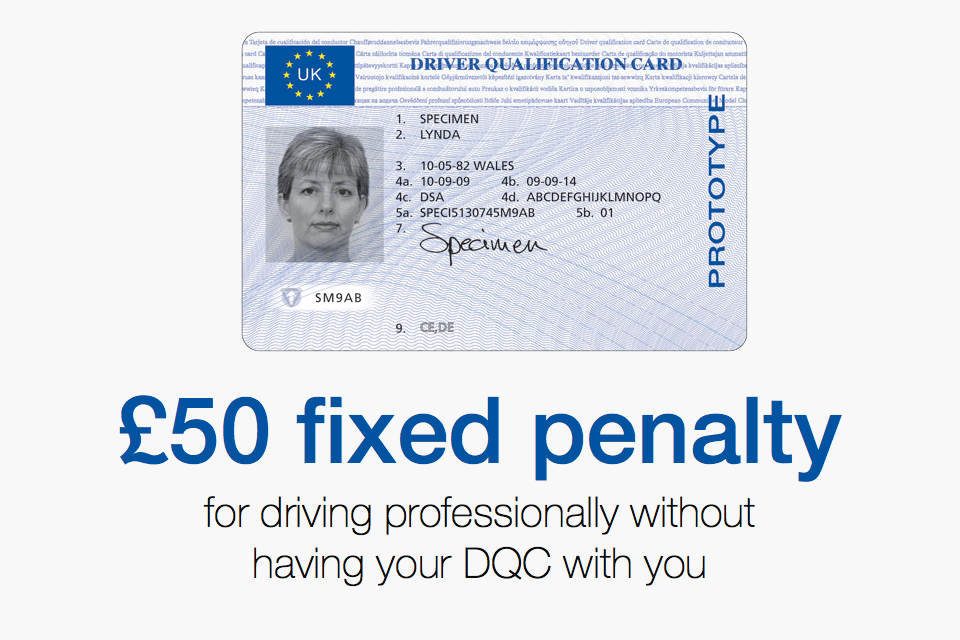Driver CPC deadline reached
The deadline for lorry drivers with acquired rights to finish their first 35 hours of Driver CPC periodic training has now passed.

The Driver Certificate of Professional Competence (CPC) was introduced in:
- 2008 for bus and coach drivers
- 2009 for lorry drivers
New drivers who drive for a living had to start taking the Driver CPC initial qualification from then.
Existing drivers were given ‘acquired rights’ which took their previous experience into account.
To stay within the rules, both new and existing drivers must then do 35 hours of periodic training every 5 years.
Making roads safer
Yesterday (9 September 2014) was the deadline for existing lorry drivers to finish their first 35 hours of training.
This means that from today (10 September 2014), all professional lorry, bus or coach drivers on Great Britain’s roads have proved their skills and taken training to keep themselves up to date.
The Driver CPC syllabus aims to keep drivers up to date on things like how to:
- load vehicles safely and securely
- make sure passengers are comfortable and safe
- apply the rules about professional driving, eg drivers’ hours
- assess emergency situations and give first aid
- optimise fuel consumption
- prevent trafficking in illegal immigrants
Most drivers met the deadline
The latest figures show that 664,000 drivers have now done their first block of training. This compares to industry estimates suggesting there are between 425,000 and 675,000 professional drivers in Great Britain.
Drivers who haven’t finished their training
If you had acquired rights and haven’t yet completed 35 hours of periodic training, you’re not allowed to drive professionally again until you complete it.
Any training you’ve already done stays valid for 5 years from the date you took the course, and isn’t lost because of the deadline.
You can check your Driver CPC periodic training hours and find approved training courses online.
Driver qualification card
You get a driver qualification card (DQC) when you pass the Driver CPC initial qualification or complete 35 hours of periodic training.
You must carry this while driving a large goods vehicle or passenger-carrying vehicle professionally.

You can get a £50 fixed penalty for driving professionally without having your DQC with you.
Waiting for your DQC
You can still drive professionally if you’ve just completed your periodic training and you’re waiting for your DQC to arrive.
You should contact the training centre where you did your training if it isn’t showing on your record 5 days after taking it.
Lost, stolen or damaged DQC
You must email the Driver and Vehicle Standards Agency (DVSA) if your DQC has been lost, stolen or damaged.
Enforcing Driver CPC
Driving without a DQC, or failing to produce it, carries a maximum fine of £1,000 for both the driver and the operator licence holder.
These offences will be referred to the Traffic Commissioner who will then consider what action to take. This could include suspending the driver’s licence and/or the operator’s licence.
Keeping skills up to date
DVSA’s Chief Executive, Alastair Peoples, said:
I would like to thank the bus, coach and haulage industry for their support, including the drivers and operators who have committed to the training and the wider industry who have been invaluable in helping with the introduction of Driver CPC.
Driver CPC has a lot to offer and, by keeping their skills up to date, professional drivers are helping to make Great Britain’s roads among the safest in the world.
Real risk of action against drivers and operators
Joan Aitken, lead Traffic Commissioner on Driver CPC, said:
Traffic Commissioners want to congratulate the HGV industry on reaching this milestone. Trainers, drivers and employers have worked hard to ensure drivers are qualified in time and Traffic Commissioners look forward to seeing the same high level of compliance that was shown by the bus and coach deadline a year ago.
For those operators and drivers who have not caught up with this deadline, then the message has to be - get this sorted now. Failing to complete the hours and be equipped with drivers holding the DQC runs the real risk of action being taken against drivers and operators.
Support from the haulage industry
The haulage industry has also shown support for the scheme and has helped to encourage operators and drivers to meet the deadline.
James Firth, Freight Transport Association (FTA) Head of Road Freight and Enforcement Policy, said:
HGV drivers operate in a safety-critical environment, and it is important that they are well informed about the rules surrounding the industry. Driver CPC provides the framework to deliver appropriate and correct information to every single driver in the haulage industry.
FTA is congratulating its members who have ensured their drivers are compliant with the new obligations and have recognised the importance of continued professionalism and training.
Jack Semple, Road Haulage Association (RHA) Director of Policy said:
Five years on, we can see a progressive evolution in attitudes to Driver CPC. Hauliers increasingly talk in terms of benefits to their businesses and, following these comments, the RHA has launched a competition to promote value in Driver CPC training.
The industry has the opportunity to progress towards genuine continuing professional development, which enhances drivers’ skills and knowledge and helps to transform both the perception and reality of the profession of lorry driving within a progressive service industry.